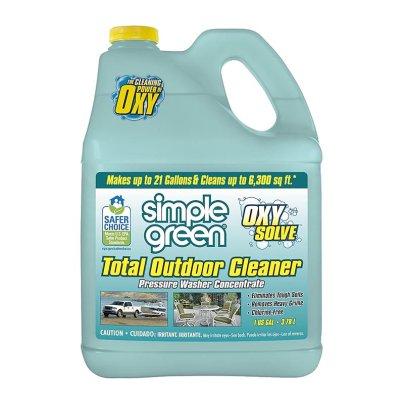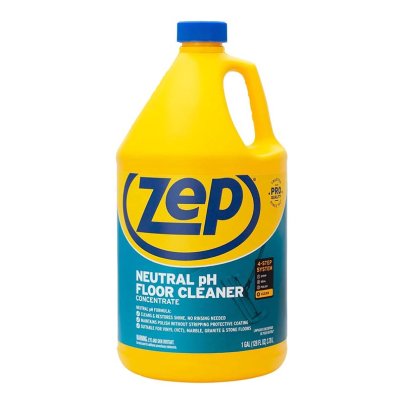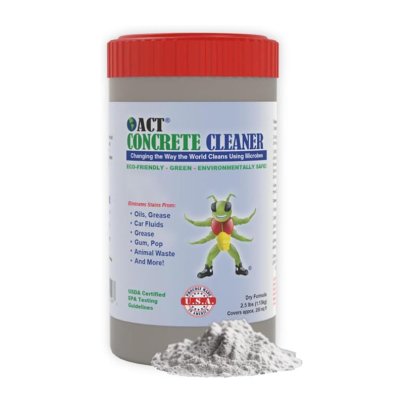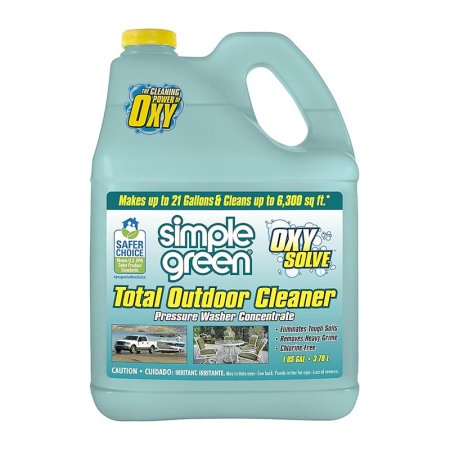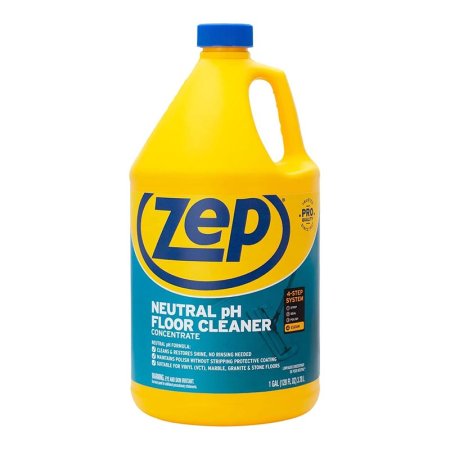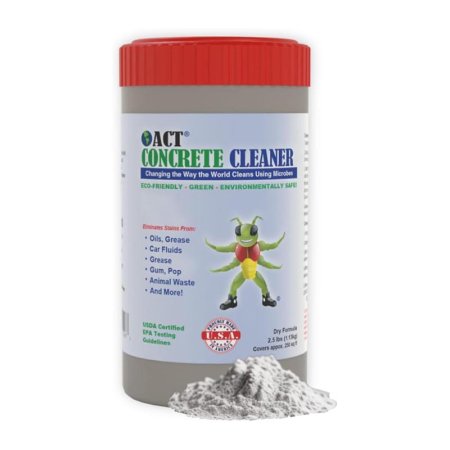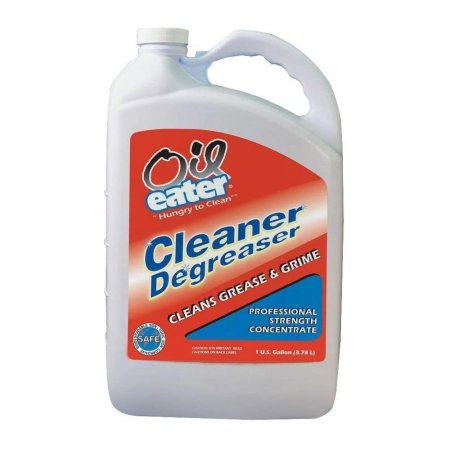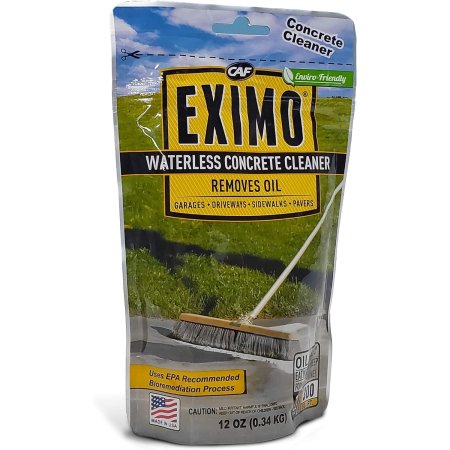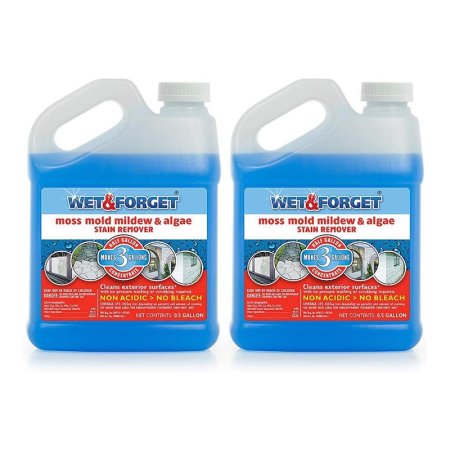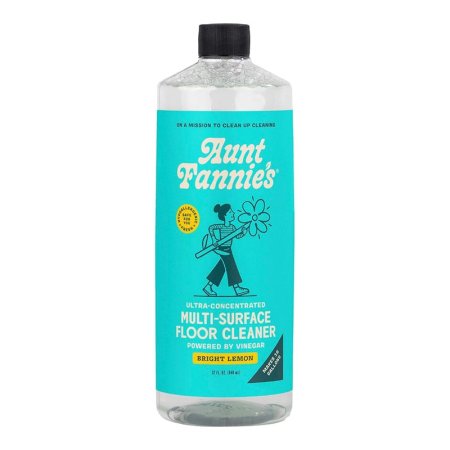
We may earn revenue from the products available on this page and participate in affiliate programs. Learn More ›
Whether you’re pressure-washing the patio or cleaning up an oil leak on the driveway, water alone won’t do the job; you need a good concrete cleaner. Choosing the right product for the task can quickly get complicated. It matters whether or not the concrete is sealed, the kind of substance you are removing, and whether you need to clean other materials with the same product, among other things. To find out more about different types of concrete cleaners, and the best use cases for them, we tested four different products on an unsealed driveway and sealed concrete garage floor with oil stains, algae, mildew, and soot from fireworks.
Our favorite product, Simple Green Oxy Solve Total Outdoor Cleaner, was formulated specifically for use with a pressure washer soap siphon. It also included instructions on mixing for use in a spray bottle. In our side-by-side comparison, Simple Green cleaned as well or better than the others in the same amount of time. The product is safe for use on a wide range of surfaces, and it was the only product we tested that also features the EPA’s Safer Choice certification.
Differences in stain types, concrete surface finishes, and environments call for a variety of cleaning options. If your project requires an enzyme-based concrete stain remover, a rust remover, a product that can be used in food preparation zones, or one that’s suitable for other specific needs, keep reading. In this guide we will showcase the best concrete cleaners for any project.
- BEST OVERALL: Simple Green Oxy Solve Total Outdoor Cleaner
↓ Jump to Review - BEST BANG FOR THE BUCK: Zep Neutral pH Floor Cleaner Concentrate
↓ Jump to Review - BEST ECO-FRIENDLY: ACT Concrete Cleaner
↓ Jump to Review - BEST DEGREASER: Oil Eater Cleaner & Degreaser
↓ Jump to Review - BEST WATERLESS: CAF Outdoor Cleaning Eximo Waterless Concrete Cleaner
↓ Jump to Review - BEST HEAVY-DUTY: RMR-86 Pro Instant Mold Stain & Mildew Stain Remover
↓ Jump to Review - BEST FOR MOLD: Wet & Forget Moss, Mold, Mildew & Algae Stain Remover
↓ Jump to Review - BEST INDOOR: Aunt Fannie’s Vinegar Floor Cleaner
↓ Jump to Review
| Testing Stats | |
| Products tested | 4 |
| Time spent testing | 6 hours |
| Tests performed | 5 |
| Price range | $13 to $69 |
Our Top Picks
If you have stubborn concrete stains, there is no need to pay for professional cleaning services. In our tests, these concrete cleaning products proved affordable, effective, and easy to use.
Best Overall
Simple Green Oxy Solve Total Outdoor Cleaner
Product Specs
- Compatible stains: Dirt, grime, mold, mildew, moss, and algae
- Cleaner type: Peroxide
- Liquid/dry: Liquid
- Working time: 3 to 5 minutes
Our Ratings: Ease of Use 5/5; Effectiveness 4.7/5; Value 4.7/5
What We Like
- EPA Safer Choice Product
- Safe for most hard surfaces
- Pressure washer concrete cleaner concentrate
- Includes mixing instructions for spray bottle
What We Don’t Like
- Requires rinsing after cleaning
Simple Green Oxy Solve outdoor concrete cleaner works as a pretreatment to weaken concrete stains before pressure-washing. It also works in the pressure washer’s cleaning solution reservoir for one-step cleaning. For spot-cleaning, you can simply mix it with water in a spray bottle. This cleaner employs the power of eco-friendly alcohol-based solvent and peroxide to deep-clean dirt, grime, mold, mildew, moss, and algae stains.
This biodegradable concrete cleaner for pressure-washing meets the criteria of the EPA’s Safer Choice Program, and it’s safe for use around pets, landscape plants, and wildlife. It is suitable for concrete and other materials including wood, composite, vinyl, metal, fabric, plastic, wicker, stone, brick, and asphalt. Use it on driveways, foundations, siding, and other surfaces.
When we applied Simple Green directly from the pressure-washer reservoir, it did a great job whitening concrete that was covered with black algae and grime. To clean up an oil spill, we used a multistep process: First, we soaked up as much of the oil as possible with cat litter. Then, after removing the litter, we saturated the stain with Simple Green from the spray bottle. After the product soaked in for a moment, we scrubbed the stain with a soft brush and rinsed. When it dried, the oil stain was gone.
Get the Simple Green concrete cleaner at Amazon, The Home Depot, Grainger, or Pressure Washers Direct.
Best Bang for the Buck
Zep Neutral pH Floor Cleaner Concentrate
Product Specs
- Compatible stains: Unlisted
- Cleaner type: pH-neutral cleaner
- Liquid/dry: Liquid
- Working time: Immediate
Our Ratings: Ease of Use 4/5; Effectiveness 4.7/5; Value 4.7/5
What We Like
- Neutral pH formula will not strip surface finishes
- Makes up to 128 gallons of cleaning solution
- Suitable for concrete, marble, granite, vinyl, and stone
- No rinsing is required
What We Don’t Like
- Not suitable for unsealed concrete
Zep neutral pH floor cleaner concentrate is a great choice for sealed concrete floors as well as marble, granite, vinyl, and stone (do not use it on wood floors). The neutral pH formula helps maintain the floor’s polish without stripping the protective coat. Applied with a microfiber mop, it cleans and restores shine without rinsing.
This concentrated formula makes up to 128 gallons of cleaning solution, saving on storage space. Zep recommends using a microfiber mop with this product instead of a traditional string mop for improved maneuverability and more efficient cleaning without leaving a residue.
Although Zep is designed for sealed masonry and other nonporous surfaces, it’s an excellent option for routine maintenance. In our tests, it did a great job brightening dingy floors with minimal effort, but tough stains required a little bit of scrubbing.
What our tester says: “Zep floor cleaner is not intended for use as a concrete degreaser for driveways, but it did an excellent job removing cooking oil splatter from my stone tile patio.”—Mark Wolfe, Product Reviews tester & writer
Get the Zep concrete cleaner at Amazon, Lowe’s, or The Home Depot.
Best Eco-Friendly
ACT Concrete Cleaner
Product Specs
- Compatible stains: Oil, grease, antifreeze, gum, animal waste, mold stains, and more
- Cleaner type: Enzyme
- Liquid/dry: Dry
- Working time: 3 to 4 weeks
Our Ratings: Ease of Use 5/5; Effectiveness 4.7/5; Value 4.7/5
What We Like
- U.S. Department of Agriculture (USDA)-certified adaptive enzyme formula
- Breaks down oil into inert substances
- Simple to use; apply and walk away
- Safe for concrete, pavers, wood, plastic, and more
What We Don’t Like
- Cleaning takes up to 4 weeks
The only thing that kept ACT Concrete Cleaner out of our top spot was time. ACT effectively releases oil, antifreeze, gum, animal waste, mold, and grease stains from concrete, pavers, wood, plastic, and other surfaces without scrubbing. It uses the same effective processes employed by the oil and gas industry and commercial warehouses to break down and bioremediate petroleum hydrocarbons and proteins (it does not remove paint). Stain materials are converted to water and carbon dioxide.
To use, simply apply the dry cleaner to the stained surface, gently work it into the stain with a broom or scrub brush, and let it sit; you should see full results in 3 to 4 weeks. The product is environmentally friendly and safe for use around people, animals, and plants.
We liked the idea of bioremediation for an oily mess in the garage or driveway. Instead of using a detergent to essentially flush the oil downstream, the enzymes in ACT break down the oil into carbon dioxide, which binds to the concrete, hydrogen, and oxygen.
What our tester says: “It took a couple of weeks for the cleaning process to wrap up and the product to dissipate, but when it finally did, I thought the concrete looked as good as new.”—Mark Wolfe, Product Reviews tester & writer
Get the ACT concrete cleaner at Amazon, Lowe’s, or The Home Depot.
Best Degreaser
Oil Eater Cleaner & Degreaser
Product Specs
- Compatible stains: Grease and oil
- Cleaner type: Water-based
- Liquid/dry: Liquid
- Working time: Immediate
Our Ratings: Ease of Use 4/5; Effectiveness 5/5; Value 4.7/5
What We Like
- USDA-certified biodegradable formula
- Safe for indoor use, including food service applications
- Cost-effective ultra-concentrated formula
- Water-based concrete degreaser
What We Don’t Like
- May discolor sealed concrete
Oil Eater cleaner/degreaser is formulated to safely dissolve grease and oil on most surfaces. It is nonacidic, noncorrosive, nonhazardous, contains no abrasives or petroleum solvents, and is USDA approved for nonfood surfaces. The water-based and biodegradable product is ultra concentrated, so follow the dilution chart on the label to use it as a light, medium, or heavy-duty degreaser.
In addition to removing grease and oil stains on concrete, it can be used on household floors, carpets, tubs and tile, grills, decks, stoves, engines, tires, siding, asphalt, and many other surfaces.
Similar to our best overall pick, Oil Eater proved very effective in a wide range of cleaning applications. It easily handled typical sidewalk, driveway, and basement floor crud, but our testing was limited to smaller work areas. In a 10:1 dilution rate with water, one application was all it took to get rid of a fresh oil stain. In spray-on applications, Oil Eater rivaled or exceeded Simple Green’s 20:1 dilution cleaning power. Unfortunately, we could not use Oil Eater in the pressure-washer soap tank because the resulting solution would have been too weak.
Get the Oil Eater concrete cleaner at Amazon, Tractor Supply Co., The Home Depot, or Walmart.
More Great Options
Although we have not tested the following products, they offer additional concrete cleaning solutions and come highly recommended by past users.
Best Waterless
CAF Outdoor Cleaning Eximo Waterless Concrete Cleaner
Product Specs
- Compatible stains: Gas, diesel, oil, grease, and petroleum-based materials
- Cleaner type: Microbes
- Liquid/dry: Dry
- Working time: 4 weeks
What We Like
- Eco-friendly formula
- Easy-to-use dry application
- Available in different sizes
- Suitable for residential and commercial use
What We Don’t Like
- Takes a long time to clean
- Requires reapplications weekly (up to 4 times)
CAF Eximo concrete cleaner uses microbes to break down hydrocarbon chains in oil to lift away stains on concrete caused by gas, diesel, oil, grease, petroleum-based materials, and more. It is a powerful, eco-friendly, natural, waterless cleaner that is highly effective against stains but completely safe for surrounding landscape plants and grass as well as people and pets. It’s suitable for wet or dry parking areas, sidewalks, concrete patios and stairs, pavers, and other similar surfaces.
To use, work the dry or wetted product into the stain with a broom, and leave it on the surface; there’s no need to sweep it up or wash it off. For complete stain removal, apply the product weekly for 4 weeks. Living microbes in the cleaner follow stains and spills deep below the surface, consuming petroleum through tiny crevices in the concrete and even into the subsoil below.
Get the CAF concrete cleaner at Amazon or Walmart (3 pounds).
Best Heavy-Duty
RMR-86 Pro Instant Mold Stain & Mildew Stain Remover
Product Specs
- Compatible stains: Mold and mildew
- Cleaner type: Sodium hypochlorite
- Liquid/dry: Liquid
- Working time: Immediate
What We Like
- Professional-grade residential and commercial cleaner
- Does not require any mixing
- Works on concrete, wood, brick, plywood, and drywall surfaces
- Whitens concrete without harmful ingredients
What We Don’t Like
- Should not come into contact with metals
RMR-86 Pro Instant mold and mildew stain remover is a fast-acting solution that utilizes deep- penetrating surfactants with a unique blend of pure sodium hypochlorite to remove stubborn stains. This heavy-duty concrete cleaner features powerful surfactants to loosen the bond between the stain and the concrete’s surface, along with sodium hypochlorite’s powerful bleaching action that kills mold and mildew on contact.
This is a professional-grade cleaner that comes as a ready-to-use concrete stain remover and is powerful enough to dissolve mold and mildew stains in seconds without scrubbing. It is safe for use on concrete, wood, brick, plywood, drywall, and other areas where mold and mildew grow.
Get the RMR-86 concrete cleaner at Amazon, The Home Depot, Walmart, or RMR Solutions.
Best for Mold
Wet & Forget Moss, Mold, Mildew & Algae Stain Remover
Product Specs
- Compatible stains: Moss, mold, mildew, and algae
- Cleaner type: Alkyl dimethyl benzyl ammonium chloride
- Liquid/dry: Liquid
- Working time: 1 week to 12 months
What We Like
- 1 gallon cleans up to 2,250 square feet
- Safe to use on concrete, wood, canvas, vinyl, aluminum, and upholstery
- Nonacidic and noncorrosive ingredients
What We Don’t Like
- Must be used away from lakes and streams
Basements, garages, and driveways are prone to being near moisture, which is a great place for mold and mildew to grow. For removing this pesky buildup, try the Wet & Forget stain remover. This versatile and effective cleaner is safe to use on concrete, vinyl, wood, canvas, aluminum, and even upholstery. The brand states that green stains will take 1 to 2 weeks to clear up, black or stubborn stains take a few months, and long-settled stains may take 6 to 12 months to fade.
A single gallon jug can produce enough cleaner for over 2,250 square feet, and the formula is made without the use of bleach or other acidic ingredients. To use, simply dilute at a 1:5 ratio with clean water in a garden sprayer. Be advised that this should be applied at least 4 to 5 hours before any expected rainfall.
What our tester says: Glenda Taylor, a BobVila.com product tester and writer, notes in our tested guide, “I waited until a bright morning with no rain forecast and sprayed the foundation thoroughly with Wet & Forget, following the instructions to let the solution soak in for up to 5 hours. Later that afternoon I returned and found the previously mold-darkened areas looking light and powdery. I used a stiff dry brush to remove the powder, and the concrete blocks beneath looked clean with no dark or stained areas. To be sure, I went back a few days later, after it had rained, and the foundation was still free of mold.”
Get the Wet & Forget concrete cleaner at Amazon (2-pack), Lowe’s, or Walmart.
Best Indoor
Aunt Fannie’s Vinegar Floor Cleaner
Product Specs
- Compatible stains: Dirt and grime
- Cleaner type: White vinegar
- Liquid/dry: Liquid
- Working time: Immediate
What We Like
- Commercial-grade eco-friendly floor cleaner
- Suitable for use on concrete, bamboo, tile, hardwood, and more
- Versatile application methods
- Hypoallergenic; Environmental Working Group (EWG) A rated
What We Don’t Like
- Limited to use on finished, sealed concrete
Aunt Fannie’s vinegar floor cleaner is an excellent indoor concrete cleaner. In addition to cleaning concrete floors and countertops, it works on hardwood, tile, bamboo, vinyl, laminate, stone, or linoleum. This 32-ounce bottle can create over 16 gallons of concrete cleaning solution and can be used with a mop and bucket, in a spray bottle, or in a floor-cleaning machine.
This option comes in multiple sizes and choices of scent, which is a benefit many other concrete cleaners do not provide. The hypoallergenic, commercial-grade, and EWG A-rated cleaner is also made with white vinegar, which makes it safe for homes with children and pets or areas that are close to wildlife.
Get the Aunt Fannie’s concrete cleaner at Amazon, Walmart, or Grove.
Jump to Our Top Picks
How We Chose and Tested the Best Concrete Cleaners
Because of its texture, porosity, and susceptibility to damage from acid exposure, concrete presents cleaning challenges. We considered the broad diversity of concrete cleaning scenarios and selected highly rated products deemed safe for use on sealed concrete, unsealed concrete, or both. Since many cleaners are specialized for certain types of stains, and may be compatible with a wider or narrower variety of surfaces in addition to concrete, we included both general- purpose and limited-use options. Throughout the process, we favored the most environmentally friendly products.
For the products we tested, we started with a driveway that was already stained with black algae and soot from fireworks, then added motor oil stains for good measure. We marked off squares to test the products, used them as directed, and evaluated the cleaning process and effectiveness of each. After testing, we recorded our observations on a scoring rubric before awarding the product titles.
What to Consider When Choosing a Concrete Cleaner
Since there are many cleaners on the market to choose from, you may be interested in knowing how these specific products work to remove different types of stains on concrete. Read on to find out how stains are classified, which cleaners work on the different kinds of stains, and to discover other useful tips that can help you choose the best concrete cleaner for your project.
Stain Type
Biological stains are caused by living organisms such as mold, moss, and algae. They often appear as green streaks, film, or cushiony growth over a broad area on concrete surfaces that stay damp. This can be a recurring problem in humid areas, so it’s helpful to have a fast-acting, long-lasting solution. Home remedies like scrubbing with bleach or white vinegar are commonly recommended, but commercial cleaners do the job faster, more thoroughly, and can help prevent regrowth.
Spills and leaks of hydrocarbons (petroleum products like motor oil), cleaners, paint, and solvents also cause unsightly concrete stains. These products penetrate the porous surface of the concrete causing discoloration. In some cases, they can even cause chemical reactions that may physically degrade the concrete surface.
Be sure to choose a cleaner that is recommended for use on the particular spill you’re dealing with. Enzyme cleaners can neutralize many volatile compounds, eliminating their negative environmental impact, and absorbent cleaners pull the spilled product out of worn or porous concrete.
Ingredients
In choosing an appropriate concrete cleaner, be aware that different cleaners act in different ways to banish stains, and they also react differently to the concrete surface. Cleaners may use pH neutral, alkaline, or acidic formulas to chemically lift stains. Concrete is made with lime, which is alkaline, so the surface must be neutralized after using acid cleaner. Enzyme and bacteria-based cleaners use biochemical reactions to digest or degrade chemical pollutants into inert substances.
- pH-neutral cleaners are often used to clean sealed concrete surfaces indoors without embedded dirt. If the concrete needs only a mild cleaning, pH-neutral cleaners can also be used on unsealed concrete, indoors or out.
- Alkaline concrete cleaner is a powerful degreaser designed to remove burned oil, tar, soot, grease, and other petroleum-based stains.
- Acid concrete cleaner is made with hydrochloric acid or phosphoric acid that reacts with the concrete surface. It is used to remove efflorescence, hard water stains, and other scaly mineral salt buildup.
- Enzyme cleaners come in different formulations that attack, break down, and in some cases digest hydrocarbon, starch, or protein-based stains. These cleaners use genetically modified bacteria that feed on grease and oil.
Concentration and Form
Concrete cleaners come in either liquid or dry applications. Most liquid concrete cleaners are for biological or mineral stain removal. They are typically chemical-based cleaners, although some may be enzyme-based. Ready-to-use formulations are fast and convenient, while concentrates, which must be diluted with water before use, are often more economical.
Dry concrete cleaners are made to separate hydrocarbon stains from the surface of the concrete and absorb liquids. Bacterial cleaners are applied dry. The microbes activate when they come into contact with hydrocarbons and then slowly consume the remnants of the stain until it is gone.
Effectiveness and Versatility
Most of the concrete cleaners on the market are effective at cleaning grease, oil, dirt, grime, animal waste, and more either on application, with scrubbing, or even power-washing. While cleaning the surface is important, many cleaners are also capable of conducting deep-cleaning without damaging concrete by breaking down and dissolving dirt and grime deep within the surface.
Cleaning Method
With such a variety of cleaning products, cleaning methods vary as well. You might know how to clean concrete with a liquid degreaser, but dry enzyme cleaners work differently. Regardless of the product, be sure to read and follow all safety, application, cleanup, and disposal instructions.
- Many of the concentrated liquid products are well suited for use as a pretreatment before pressure-washing. You can use these products without a pressure washer, but serious scrubbing with a stiff bristle brush would be required for thorough cleaning, followed by a thorough rinse. After using an acid-based cleaner, it is necessary to neutralize the concrete surface with a wash solution of ½ cup of baking soda mixed with 1 quart of water, followed by a thorough rinse with clean water.
- Dry-product cleaning methods vary as well. Absorbent and enzyme cleaners typically get the job done within a few hours; afterward, they are swept up and reapplied if needed. Bacteria-based cleaners are meant to be left in place indefinitely, as it can take several weeks for the microbes to fully colonize the area.
Working Time
Cleaning time could take as little as a minute or as long as several weeks. Biological stains like algae and mold are relatively easy to kill and clean, whereas cleaning deep-set hydrocarbon stains with an enzyme or bacterial cleaner can take a long time. The major difference in working time, as mentioned previously, is due to the way the product works.
Chemical reactions such as the separation of grease from concrete by alkaline cleaners occur more quickly than bacterial digestion of petroleum. But the trade-off is that the fast-acting cleaner leaves petroleum pollutants intact, whereas the bacterial treatment converts the pollutant into water and carbon dioxide.
Safety
The environmental impact of concrete cleaning products varies based on the nature of the stain or spill being cleaned—and the product itself. Care should always be taken to remove and properly dispose of toxins, rather than dispersing them into the environment.
Pressure-washing spreads debris from the concrete surface into the surrounding environment, so this process is effective and safe to use on biological stains when accompanied by eco-friendly cleaners. Potential environmental pollutants like oil or gas should ideally be remediated by enzyme or bacteria-based cleaners whenever possible.
While concrete cleaners are safe when stored and used properly, they pose inherent risks for skin contact, ingestion, inhalation, and other accidental exposure. Keep these products stored out of the reach of children and pets. Never store them in unmarked containers, and always heed the manufacturer’s instructions for safe use, including the use of personal protective equipment, safe storage, and first aid in case of emergency.
FAQs
Looking for more information about concrete cleaners? Read on for answers to several common questions about these products.
Certain concrete cleaners are made for a variety of surfaces and stains including bamboo, vinyl, tile, hardwood, linoleum, stone, and even upholstery. However, some of the options on the market are made for use on concrete surfaces only. Always read the instructions included on a product before applying it to certain surfaces.
Always keep children and pets away from the area while using concrete cleaner, and store the products out of their reach. Once cleaned, the area is safe for use right away.
Remove oil stains and other hydrocarbons with a bioremediation driveway cleaner. For tough algae or moss growth, spot-clean with a contractor-grade hypochlorite-based cleaner. Use an acid concrete driveway cleaner to deep-clean and remove efflorescence. For general cleaning of a dirty driveway, a pressure-washing cleaner will do the trick.
The process of pressure-washing is made easier and more efficient if the surface is pretreated with a concrete cleaner. Apply the cleaner at low pressure and allow it to stand for 3 to 5 minutes before pressure-washing.
Frequent cleaning with an appropriate cleaner is the best way to prevent mold, mildew, and algae from growing on a concrete surface. One of the best options for fighting algae on concrete is the Wet & Forget concrete cleaner, which has a concentrated formula that slowly dissolves pesky mold and mildew over time while preventing any regrowth. Another way to prevent any mold and mildew growth is to use a concrete sealer.
Concrete cleaners should be used at least once a year to prevent deep stains from settling. However, garages, auto shops, or other commercial spaces with a lot of grease and oil could benefit from the use of a concrete cleaner once a week to keep old and new stains at bay.
There is a wide range of products, stains, and surfaces to consider. Some products work almost instantly on mild staining, but a few minutes of soaking or agitation might be required for deep-set stains. Some of the enzyme-based cleaners on the market take weeks to remediate stains.
Physical cleaners, like scrubbing or pressure-washing without a cleaner, only work for basic dirt and debris buildup. Carbon, protein, and mineral-based stains, such as oil, algae, mildew, rust, and many other types, almost always require the use of a cleaning solution, which could be chemical or biologically based.
Pressure washers vary in their pressure rating, flow rate, and accessories. A good concrete pressure washer should have a pressure rating of about 3,000 pounds per square inch and flow rate of at least 2 gallons per minute.
Meet the Tester
Mark Wolfe is a writer and product tester with a background in the green industry. He’s also an avid DIYer who lives in an older home. When he isn’t writing, he spends his time upgrading, repairing, and replacing anything and everything in his home, yard, and garden. He tests and writes reviews about hand tools, lawn care and home repair products, and outdoor-living goods.
